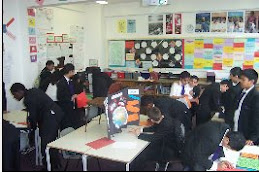When tutoring beginner teachers at TeachFirst Summer Institute I'm often asked what 'recommended reading' I would give before entering the classroom. During my first year teaching I consumed books believing they would give 'the answers' to all my problems. Sadly, they don't. However, having spent so long reading educational material, my recommended reading is based on the 3 books that gave me enough ideas to start creatively experimenting with procedures in my classroom until I did work out what 'my answers' were.
1. Teaching Outside The Box - LouAnne Johnson.
This book literally changed my life during the first half-term of teaching. After 6 weeks of being sworn at, breaking up fights and having resources thrown around I'd had enough. I don't remember how I came across this book but its written by the woman that 'Dangerous Minds' is based on. Given that I felt a bit like Michelle Pfeiffer at this point, I probably sought it out. Boy, did it make me want to get in there and sort out the situation.
The genius of Teaching Outside The Box is it's conversational style mixed with hundreds of awesome and well-explained ideas. It also doesn't shy away from reality. There is an honest (almost brutal) section about the times when you want to chuck it all in, and some advice on what to do in this situation. I have photocopied this several times for friends/colleagues in melt-down.
Each half-term, even after three years of teaching, I come back to my well-thumbed copy of Teaching Outside the Box and each time it teaches me new things. Definitely my 'Number 1 recommended reading' by an English Mile.
Also, check out her website http://www.louannejohnson.com/ - it's pretty good too!
2. 101 Ways To Make Your Classroom Special - James D. Sutton.
I bought this in America because Americans have much better books about this stuff than we do. I was concerned it might be a bit saccharine but all the ideas are sensible and help make students feel appreciated and special. Some ideas are for younger ones - e.g. having a ridiculous 'don't go there' hat that you place on the desk of students who are starting to be disruptive. [By the way, in my school I am certain this would result in said student putting on the hat and being a further disruption]. But other ideas are great - for instance, homework passes. I have a system by which students can earn a small slip that allows them to skip a homework at their convenience. I have NEVER seen students work so hard for anything.
3. Fred Jones' Tools For Teaching - Fred Jones.
A huge, colourful, interesting and useful book. It's heavy, the pages are thick it's an odd shape and it's in colour people! It also has a DVD with it but i've never watched it. Apparently it has some examples of Mr. Jones in action.
The subtitle to this book is 'discipline, instruction, motivation' and that says it all. Mr. Jones is pretty prescriptive so you might not agree with everything he says. Yet he takes care to talk about the reasons behind his behaviour policies and procedures, explaining why they work with students. Also, while I do agree that it's about "experimenting" and "finding your own way" beginner teachers often desperately want some 'answers'. Well here are some very specific ones. If they don't like, fine. But at least there's an answer they can start with and work from there.
8 months ago
